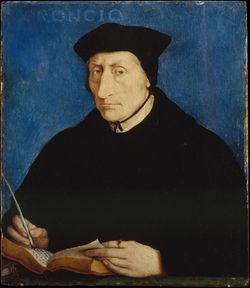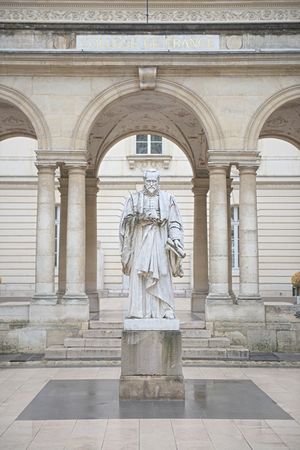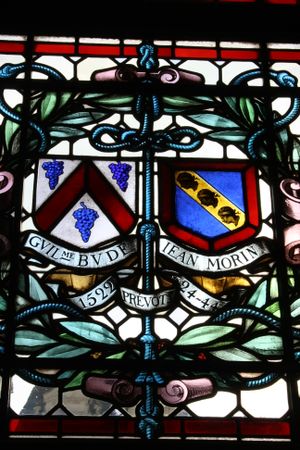گييوم بوديه
Guillaume Budé | |
|---|---|
 گييوم بوديه، پورتريه بريشة جان كلويه | |
| وُلِدَ | 26 يناير 1467 پاريس، مملكة فرنسا |
| توفي | 23 أغسطس 1540 (aged 73) پاريس، مملكة فرنسا |
| العصر | فلسفة النهضة |
| المنطقة | الفلسفة الغربية |
| المدرسة | إنسانية النهضة |
التأثر
| |
التأثير
| |
گييوم بوديه (Guillaume Budé ؛ لاتينية: Guilielmus Budaeus؛ 26 يناير 1467 - 23 أغسطس 1540) كان دارساً فرنسياً.
سيرته
وُلِد بوديه في پاريس. وذهب إلى جامعة أورليان لدراسة القانون، إلا أنه لسنوات طويلة، لثرائه، سلك حياة الخمول والتشتت. وحين بلغ الرابعة والعشرين من العمر، انتابته رغبة قوية للدراسة وأحرز تقدماً سريعاً، خصوصاً في اللاتينية واليونانية.[1]
The work which gained him greatest reputation was his De Asse et Partibus Eius (1514), a treatise on ancient coins and measures. He was held in high esteem by Francis I, who was persuaded by him, and by Jean du Bellay, أسقف ناربون, to found the Collegium Trilingue, afterwards the كلية فرنسا, and the library at فونتينبلو, which was removed to Paris and was the origin of the Bibliothèque Nationale. He also induced Francis to refrain from prohibiting printing in France, which had been advised by the السوربون في 1533. وقبل ذلك، كان قد أرسله لويس الثاني عشر إلى روما سفيراً إلى ليو العاشر، وفي 1522 عـُيـِّن maître des requêtes وكان لعدة مرات prévôt des Marchands.[2]
When he lived, in Paris, his request was that he should be buried at night, and his widow's open profession of Protestantism at Geneva (where she retired after his death), caused him to be suspected of leanings towards Calvinism.[1] Sections of his correspondence with Erasmus also suggest this religious inclination.[بحاجة لمصدر] At the time of the St. Bartholomew's Day Massacre, the members of his family were obliged to flee from France. Some took refuge in Switzerland, where they worthily upheld the traditions of their house, while others settled in Swedish Pomerania under the name Budde or Buddeus (see Johann Franz Buddeus).[1]
Budé was also the person of Annotationes in XXIV. libros Pandectarum (1508), which, by the application of philology and history, had a great influence on the study of Roman law, and of Commentarii linguae Graecae (1529), an extensive collection of lexicographical notes, which contributed greatly to the study of Greek literature in France.[1] Epistolae (1520, 8vo) is a collection that contains only a small part of the voluminous correspondence of Bude, written in Greek with remarkable purity.
تراسل گييوم بوديه مع معظم مثقفي عصره، وبينهم إرازموس، الذي سماه "أعجوبة فرنسا"، و توماس مور. وكان يكتب ببلاغة باليونانية واللاتينية.[1]
الأعمال
- Translations from Plutarch, from 1502 to 1505
- Annotationes in XXIV libros Pandectarum, Paris, 1508
- Annotationes in quattuor et viginti pendectarum libros. Paris, Josse Bade, 1532
- De contemptu rerum fortuitarum libri tres, Paris, 1520
- Epistolae, in 8vo, 1520
- Libri V de Asse et partibus ejus (in اللاتينية). Venice: Aldo Manuzio, eredi & Andrea Torresano. 1522.
- Summaire ou Epitome du livre de Asse, Paris, 1522
- De studio litterarum recte et commode instituendo, Paris, 1527
- Commentarii linquae graecae, Paris, 1529
- Commentarii Linguae Græcae, Gulielmo Budaeo, consiliario Regio, supplicumque libellorum in Regia magistro, auctore. Ab eodem accuratè recogniti, atque amplius tertia parte aucti. Ex officina Roberti Stephani typographi Regii, Parisiis, 1548
- De philologia, Paris, 1530
- Libellorumque magistri in praetorio, altera aeditio annotationum in pandectas, Paris, Josse Bade, 1532
- De Studio Literarum Recte Et Commode Instituendo. Item Eiusdem G. Budaei De Philologia Lib. II. Basileae, apud Ioan. Walderum, martio 1533
- De transitu Hellenismi ad Christianismum libri tres, Paris, Robert Estienne, 1534
- De l'institution du prince, in-folio, 1547
- Opera omnia, 4 vol. in-folio, Basel, 1557
العائلة
گييوم كان ابن آمي (ت. 1502) وأليس لو پيكار. He married Robert Le Lieur when he was about 15 years old.[3] Their children included:[4]
- Dreux Budé (d. 1547), married Marthe Paillart
- François (d. 1550)
انظر أيضاً
ملاحظات
- ^ أ ب ت ث ج One or more of the preceding sentences incorporates text from a publication now in the public domain: Chisholm, Hugh, ed. (1911). . دائرة المعارف البريطانية. Vol. 4 (eleventh ed.). Cambridge University Press. pp. 749–750.
{{cite encyclopedia}}: Cite has empty unknown parameter:|coauthors=(help) - ^ خطأ استشهاد: وسم
<ref>غير صحيح؛ لا نص تم توفيره للمراجع المسماةEB1811 - ^ McNeil, David O. (1975). Guillaume Bude and Humanism in the Reign of Francis I. Google Books: Geneve Librairie Droz. p. 7. ISBN 9782600030571. Retrieved 20 May 2015.
- ^ Sylie Charton le Clech, Chancellerie et Culture (1993), 324
المراجع
- Loys Leroy (or Regius), Vita G. Budaei (1540)
- D. Rebitté, G. Budé, restaurateur des études grecques en France (1846)
- E. de Budé, Vie de G. Budé (1884), who refutes the idea of his ancestor's Protestant views
- D'Hozier, La Maison de Budé
- L. Delaruelle, Études sur l'humanisme français (1907)
- D. McNeil, Guillaume Budé and Humanism in the Reign of Francis I (1975)
وصلات خارجية
- مقالات المعرفة المحتوية على معلومات من دائرة المعارف البريطانية طبعة 1911
- Wikipedia articles incorporating text from the 1911 Encyclopædia Britannica
- Articles with hatnote templates targeting a nonexistent page
- Missing redirects
- Articles containing لاتينية-language text
- Pages using Lang-xx templates
- Articles with unsourced statements from February 2016
- CS1 اللاتينية-language sources (la)
- كتاب من پاريس
- مواليد 1467
- وفيات 1540
- خريجو جامعة أورليان
- كتاب اللاتينية في القرن 16
- إنسانيو النهضة الفرنسيون
- دارسون فرنسيون
- هلينيون فرنسيون
- كتاب فرنسيون في القرن 16
- كتاب القرن 16
- مشرعو القرن 16


